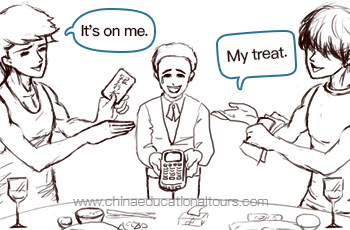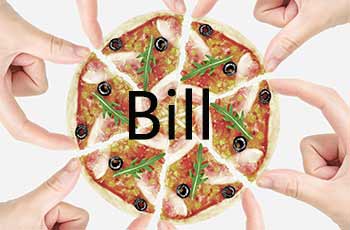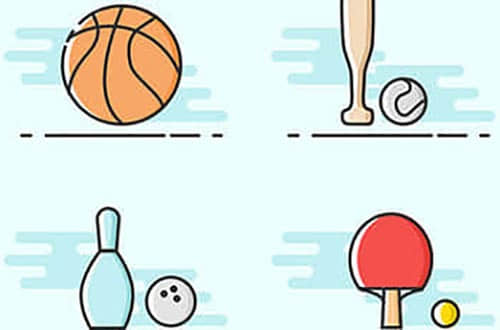In China, Who Pays?

Dining situation: You’re on a 3-week vacation in China. One day, while out exploring, you meet a nice Chinese family with 2 children who suggest that you and your family (if you have them with you) should go out to dinner. You agree and a time and place is set (perhaps as soon as that very evening). The evening comes and everyone has a wonderful meal talking and laughing for 2 hours. It’s now time to go and that means paying the bill. As a foreigner, what should you do? Let’s have a quick quiz and see how great, or poorly, you choose. (Answers and consequences follow).
A) Let the family pay the entire bill and thank them.
B) Let the family pay the entire bill, but offer to leave the tip.

C) Let the family pay the entire bill, but offer (if there’s enough time) to go someplace for desert or an activity which you will pay for.
D) Offer to pay the bill yourself, but then let the family pay it if they are kind enough to offer.
E) Offer, suggest, or ask that the bill is split down the middle (seemingly fair if you have a spouse and at least one child with you, but what if you’re alone).
F) Ask the server to put your food on your own separate bill.
G) Pay the entire bill yourself.
(Note: we’ve eliminated the choice where you let the family pay this time and you offer to pay ‘next time’ – often referred to as the “tick-tock” method – because we are assuming here that since you are on vacation, there may not be another chance to return the favor).
The good news for anyone baffled by trying to choose the right answer is that there is no perfectly correct answer above – the “right” answer depends entirely on the situation. However, there are definitely wrong answers above and if you picked one of them, be thankful you did it on this quiz here, and not in real life.
The Wrong Answers
The worst possible answer above is F (ask the server to put your food on your own separate bill). If you chose this, you have likely offended the family in the most severe manner, you will likely never see or hear from them again, and you have helped affix a “rude” label to every one of your countrymen in the eyes of this family and every family they tell the story to.
The next worst answer is E or B (splitting the bill 50/50 or offering to leave the tip). You have likely offended the family, they may never want to speak to you again, and everyone from your country will seem offensive and weird in the eyes of this family and every family they tell the story to. FYI, tipping is not common in China and if it ever happens, amounts to only a few dollars.
Close Answers
Acceptable answers, again depending on the situation, are A, C, D, and G, with D (offer to pay but finally let the family pay) being the closest to perfect, although G (pay the bill yourself) comes in a close 2nd. If you chose any of these choices, you will have impressed the family, they will want to stay in contact with you, and you may have begun a friendship that will last the rest of your life. Additionally, you’ve best represented your own culture and helped improve the image of your countrymen in the eyes of this family and every family they tell the story to.
If you’re confused as to the results of the quiz, then please continue reading as this article is perfect for you. And if you’re someone who feels very uncomfortable picking up the entire check, buckle up because it’s going to be a bumpy ride.
Setting the ‘Scene’ for those who’ve never ‘Seen’ it – An Introduction to “The Fight”
For all the readers who are unfamiliar with Chinese dinner paying practices, here’s an introduction to the type of scene that often plays out across China in thousands of restaurants every day.
 The scene of Chinese are rushing to pay.
The scene of Chinese are rushing to pay.
Near the end of the meal, not necessarily after the meal has been concluded, 2 or more men will stand up and begin talking loudly and slightly aggressively. They will stand close to each other and argue for at least one minute, often for a little longer. A server will likely be standing close to the men arguing with an unpleasant, somewhat helpless look on his/her face. Eventually, the men will hold money or a credit card and somewhat aggressively try to force the server to take theirs. The server will continue to stand there in as neutral of a position as possible. The tone of the men will grow more aggressive and they will raise their voices, often to the point of shouting. Occasionally, some physical pushing or shoving will take place, but not usually. Eventually, one man will back down, and the server will accept the payment from the other.
What are they arguing so passionately about? Are they friends or enemies?
They are arguing over who gets the privilege and honor of paying the entire bill. This is serious in China and anyone who takes it lightly will face social problems and consequences. They are likely friends and the more aggressive they get usually means the closer friends they are, but they could be friendly co-workers or it could be a business meal.
Why do Chinese Argue and Fight over Who Pays the Bill?
Reason #1
Relationships are paramount to nearly everything in China
Chinese people highly value relationships and treating someone to a meal is a great first step towards forming a closer connection and greater trust. Inviting others out to dinner can backfire however and destroy an already good relationship or any chance of a further relationship, if not handled carefully with great respect for Chinese customs.
To begin with, a meal is not just for “fun” or “to eat”. Having a meal with someone in China (or from China) is an important step to building a relationship – a long term friendship or partnership that encompasses responsibilities, trust, respect, and privileges that go far beyond a dinning room table in a restaurant. For Chinese, it’s all about relationship building. So, you can forget about just having a casual, nonchalant, inexpensive meal with someone who you deep down feel you’ll never see again or have little desire to continue a relationship with.
With this said, paying the bill (treating the other person or persons) clearly says, “I want to continue our relationship which we have started here.” Offering to split a bill, or simply paying for only what you have ordered, says, “I do not like you and I do not wish to continue any relationship”. Thus, splitting the bill (aka, going Dutch, or as the Chinese call it, “AA”) is severely frowned upon and taken as an insult in most cases. There are situations where “AA” is ok, and those are listed below.
Other negative messages that suggesting “AA” can convey:
- The suggester is incapable of being able to afford the meal
- The suggester is a rude person
- The suggester has been offended by something said at the table
Reason #2
The one who pays is the one who’s strong. The one who accepts is the one who’s weak.
The above quickly summarizes the underlying alpha characteristics in play. You’d be hard pressed to get anyone to come out and admit this, but belying the more altruistic notions in #1 is this hard truth of what is also at play here. The person who pays gets to claim a higher status and is looked upon as the stronger person. People get “points” for honest attempts at trying to pick up the check even if they lose in the end, but for those who quietly sit at the table and let another person pay (in situations where it is not obvious someone else will pay – which are listed below), they will be subconsciously considered the weaker, less capable person.
Reason #3
An inside track to favors
If you’re going to ever ask someone to do a favor, assuming this favor is more than just borrowing $10 or getting a tip on a good restaurant, it’s a really good idea to invite them to dinner. This is even true when you don’t have a favor in mind to ask, but instead want to save the possibility for some time in the future. So, a $200 USD dinner today can open up favor possibilities 6 months from now. Is there a time limit? It’s not written in stone, but asking someone for a major favor 10 years after buying them dinner is probably pushing the cultural boundaries. One month to a couple of years is probably average, but it also depends on how much cash you forked over. A $1,000 USD meal (don’t laugh, it’s much more common than most readers think) buys a longer period of time than one that just cost $50 USD.
Reason #4
You scratch my back, I scratch yours.
An informal rotation system also exists here referred to as reciprocity. Under the seemingly infinite layers of hospitality, the Chinese believe that eventually their meal-paying “kindness” will be repaid and one day, you will start picking up the tab. This is essentially the “tick-tock” system except that instead of “1 you, 1 me” alternating scheme, it’s more like “10 you, 10 me” system that is spread over a decade, or longer. This works decently well when both parties permanently live in the same area, but what happens when one person is in town only temporarily, like for a business conference or on vacation? In these situations, this reason doesn’t much apply and instead is usually replaced with Reason #5 or #6.
Reason #5
 a warm and hospitable Chinese old man
a warm and hospitable Chinese old man
The novelty factor
Chinese, being extremely hospitable, are normally overjoyed to entertain foreign guests. There are countless stories from western expats exclaiming how they’re treated like royalty in Chinese company. For many Chinese, just having the honor to host a foreigner is itself compensation enough. For others, it’s about showing off their wealth; crowing about local culture, delicacies, and attractions; and/or being able to show off pictures of their new “friend from afar” to coworkers, friends, and family.
Reason #6
Something slightly more self-serving
While the above reasons generally explain over 90% of why Chinese so gleefully fight over picking up the tab, there are the occasional instances where something more selfish is going on. This is not to imply something bad about the host, and it may in fact be the best situation for many foreigners. After all, reason #6 is one of the most common explanations for why people in western countries offer to pick up the tab, so in a way, this is a “welcome home” of sorts.
Similar to, but very much apart from, the ability to ask a favor of someone, here a Chinese host may be most interested in having a chance to practice their English. With so few native English speakers in China, it’s hard for Chinese people to ever have a conversation with one so when the opportunity arises, many jump at the chance. To be fair, if this is the reason behind the invitation, then it should be made clear upfront by them telling you, “I’d like to take you to dinner/grab a coffee because I really would appreciate the chance to practice speaking English and hear any suggestions you might have for me to improve.” You then know that it’s not necessarily a long-term friendship the person is after and you don’t have to feel weird about them picking up the check. Also, you get the chance to have a nice cultural exchange and a free meal.
Another possibility could be more of a business interest. If you work for a multi-national corporation, and your host is involved in business, then he/she may be after some hard earned “guanxi” (an informal system of “friends doing friends favors in business”.) Again, this could be a mutually beneficial relationship.
When Splitting the Bill (“AA”) is OK
 split the bill
split the bill
- Among the younger generation (generally below the age of 27), this practice is becoming more common especially among close friends. However, visitors should never assume that a younger person will be ok with “AA” rules. Instead, it’s best to: a) Wait and see if they suggest going “AA” or if they actually say something like, “It’s my treat”. Often, when younger Chinese are with foreigners going for a meal, they will actually say to you, “We can do AA if you like” before the meal begins. b) Casually inquire by saying, “So, do people you know usually go ‘AA’, or use ‘Tick-Tock’?” (If they aren’t familiar with the term “tick-tock”, simply explain it means one person pays one time, and the other person pays next time). (Note: if the person states that they’d like to pay, and they do not mention “AA” as an option, then regardless of their age, you are bound by the social rules that are explained in this article.)
- Among coworkers having a meal during the day, usually lunch, where everyone is mostly of equal position.
- If employees of a business eat lunch together with a foreigner who is temporarily there on business, perhaps to present or attend a conference.
- Among very close, long-time friends, regardless of age.
- Going to a fast food restaurant where individual dishes are served.
When you should pay
Who calls = who pays.

Now that we know when it’s ok to split the check, let’s take a look at when you will be expected to pay.
Note that this is very rare for visitors, travelers, or business people who are staying in China for a very short time and do not expect to return for many years. However, if you’re going to be in one place for several months, or plan to return to the same place each year or several times per year, these rules may apply to you.
The OBVIOUS ones:
1) When you need a favor, or are trying to establish your own “guanxi”, you need to pick up the tab. Footing the bill could entail entertainment activities too like golf, massages, or karaoke (KTV).
2) If you would like to show appreciation, or sincere sorrow/apologize for something.
The NOT obvious, scratch-your-head-and-say-huh ones:
3) Unlike in most western countries, when you have something to celebrate (like your birthday, your kid’s birthday, a new job, recent promotion or raise, a graduation), instead of everyone else giving you the gift and/or paying for your meal, YOU are actually expected to treat everyone who shows up. They still may bring you a present though.
4) If you are the most senior member at the table by far, you should grab the check. Examples include, you are the regional manager of a company having lunch with 5 administrative assistants or you are +40 years old having lunch with a few recent college graduates.
IMPORTANT TIP! It’s important to watch for non-verbal clues when eating. If your dinner companion(s) make a big show of looking for their wallet, it probably means you should be taking out yours.
| You should pay the bill when: |
| Asking someone for a favor. |
| Trying to get in someone’s good graces. (guanxi) |
| Extending a sincere thank you, apology, etc. |
| You have something big to celebrate.* |
| You’re by far the most senior person at the table.* |
* = Not normal in western culture
When you should NOT pay

Breath a sigh of relief … it’s on them this time.
First of all, never assume anything. Always offer to pay … repeatedly (three to five times is a good number of attempts), or at least make a move for your wallet a few times, even if you know your offers will be refused. It’s never pleasant for your host to think that you may be taking advantage of the situation. After the meal is paid for, thank the host profusely and even if you have no intention of seeing them again, you should at minimum verbally offer to return the treat, especially if the host comes to where you live/are staying.
(Note: During the ordering process, unless you are very familiar with both the host and Chinese menus, leave the ordering to the locals. You can certainly make suggestions and let them know of any dietary restrictions – like allergies – that you have which the host is usually happy to accommodate.) Here is a list of occasions when you can relax and enjoy the feast. (one of these are the complete opposite of western rules)
1) *If you already know someone and travel to their city to meet them (this also includes going to their city for another purpose, like attending a conference), they will treat you even if you stay a few nights at their house. Just make sure to return he favor if the opposite ever happens.
2) If someone clearly says, “I want to take you to dinner” as opposed to, “Let’s meet some time for dinner”. Even though in the 2nd example, the person will still likely want to pay, it’s not as for sure as when they use the language in the 1st.
3) If someone wants to take you out as a thank you for something you’ve done.
4) If senior management invites you come along to a business dinner and you’re not part of this company or business. In this case, you’re considered an honored guest. You may not feel worthy of the invitation, but enjoy it while it lasts.
5) If you are a very junior member of a business or event, a student, or recently graduated. * = Opposite of many western countries’ culture
Expert Tips!
Give MONEY, don’t give gifts – Bringing a gift is usually optional and rarely required unless it’s a special occasion like a birthday or graduation. Chinese often don’t give purchased items as gifts either – instead, they do what is widely considered one of the biggest cultural faux pas in the west – they give cold hard cash. Non-monetary gifts are often viewed as a way of concealing stinginess (ie, you give something that might look like it cost $100 USD, but you actually only paid $25 USD for it, makes it look bad on you even if the receiver of the gift would never truly know how much you paid). For business situations, corporate gifts go a long way in establishing respect and a good relationship.
Hierarchy follows age from the eldest down – Often the older generation wrestles to grab the bill out of a duty to provide and make sure others have enough to eat. In Chinese culture, the hierarchical family structure recognizes elders and breadwinners with the most amount of respect as they can best afford to support everyone else. Getting the bill then is an act of love and sacrifice with the one paying the bill receiving the most respect and admiration from the group.
| You’re NOT expected to pay the bill when: |
| Traveling to a city specifically to visit someone in his/her home. |
| Accepting a clear “let me buy you dinner” invitation. |
| Attending a “thank you” dinner. |
| Invited as a guest of the main host/company rep. |
| When you’re one of the most junior attendees. |
The Fight – Wanting to pay or making a good-faced effort to not pay
We’ve now covered the situations where it’s clear when you’ll be expected to pay or when you should not pay. If none of those situations apply, you encounter the “to pay or not to pay” dilemma. Most travelers and westerns will be in this situation where you’ll need to make a decision whether or not to pick up the entire check. Each person has to decide for themselves if the respect, admiration, power, and good-will that come with picking up the tab is worth the monetary expense. To help you decide how to handle both “I want to pay” and “I really don’t want to pay” situations, we’ve assembled a handy chart below to make it easier.
By the way, if you do decide to pay and get protest from the table, then you should insist harder and give a valid reason why. For example, you might say “I just got a pay rise, let me treat you tonight” or “Please allow me the honor, I’d really like to tonight”. Keep in mind the value of “Face”, it’s tremendously important in all Asian cultures. If you’re unsure as to what “Face” means exactly, in this case it translates to “doing something nice for someone else without making that person feel bad, or in debt to you, for receiving your good-will gesture.”
Gender note: the following situations are almost exclusively reserved for men. Women will rarely be expected to follow any of the following social rules. Ladies get a pass on this one!
| Your DETERMINATION LEVEL in paying | RECOMMENDED ACTIONS |
|
HIGH (guaranteed win) |
Avoid the commotion by: 1A) Sneaking to the cashier near the end of the meal and paying the bill. If needed, say “I’m going to the restroom” or “I’m making a call in the hallway” to not tip anyone off to your covert plan. 1B) When dining with astute guests, send your older child, spouse, etc. to the cash register in your place. 2) Use technology to your advantage by purchasing the meal on a “tuangou”, or group buying, website (like Groupon). You may need help for this method if the website doesn’t offer English. To avoid appearing stingy (because you saved money by buying online), remember to arrive significantly before your guests to complete the paperwork. |
|
MEDIUM HIGH (you want to win) |
Inject a little drama into your meal and maybe record a nice video for memory: Call for the check by loudly saying in the direction of your server “mǎi dān” (pronounced My-Dan) and then grab it quick. Don’t go over the details or even look at it, just whip out your credit card (or cash) and immediately stuff it into the server’s hand before any guest has a chance to do the same. Insist on paying by saying “It’s all on me today” or “Touch this check and there will be serious trouble.” Give your best angry face if anyone wants to argue or give you money. Occasionally, when dealing with a real expert at this game who also wants to win, this method may not be successful, but it works +90% of the time and makes for a nice dramatic close to the meal. |
|
MEDIUM (you want to win, but don’t mind losing) |
Let’s get ready to rumble! Call for the check and actually let the server put it on the table. Search for your credit card while double checking the bill. Others will very likely try to jump in and it’s ok to let them see the amount on the bill. Push their credit cards, or cash, away and make honest attempts to not let them take the actual bill. Say something like “Let me get this cheap one and you invite me to a nicer dinner later.” This method works at least half of the time. The other half of the time, your guests will not be outdone, and they will push harder than you to get the check. This is when shouting scenes like the one described at the beginning of this article take place. Other ways to win, or play the game exceptionally well: 1) If someone manages to get money into the server’s hand first, grab their money out of the waiter’s hand and give it back them, then give the waiter your money instead. 2) Arm waving, arm pulling, loud insisting, and a little pushing are always good. 3) If someone else stands up first to go pay or give the server money, grab their arm and try to yank them back into their seat. NOTE: Honestly, the bigger the scene you cause, the better. Don’t worry if they seem disgruntled at first, they will actually be happy and honored with your enthusiasm and respect for their cultural norms. You get major social points for not only paying, but also wrestling with the “big boys” for the privilege to pay. |
|
LOW (wrestling as a courtesy) |
Wait for someone else to ask for the check and when it arrives, reach for your wallet in the wrong pocket - don’t reach too fast, but don’t obviously delay either. Make several sincere offers to pay without insisting or pushing too much. Usually, your offers will be soundly rebuffed so before finally giving in, say “I’ll get the next one,” which is in line with another thing Chinese people value – lǐ shàng wǎng lái meaning “courtesy demands reciprocity.” There’s still a 10-20% you might end up paying, depending on who else is sitting at the table, so assess the risk and use discretion. |
|
NONE (you definitely don’t want it) |
When the check is about to arrive, make an excuse to leave the table like needing to go to the restroom. If you can’t escape the table, make like you can’t find your wallet or take out your credit card in a cash-only place. Be creative and invent any number of excuses why you can’t pay. These methods will likely cause you social consequences – getting a bad reputation, people not wanting to go out with you again, people not trusting you to do business, etc. – but you won’t get stuck with the check. |
EXPERT TIPS!
Keep in mind that in none of the above situations is it ok to offer to pay for only what you ordered. Besides, since most traditional Chinese meals are a group affair served on group dishes, it’s nearly impossible to even order something just for yourself. If you did order a plate for yourself and didn’t share it with the table, you’ve now compounded your insult, offensiveness, and social ineptness.
In Conclusion
Picking up the tab for dinner in China is considered an honor and a privilege and the act receives many social advantages with it. Therefore, people (mostly men) often argue and fight over who gets to have this honor and many foreign guests may face stiff resistance multiple times before ever being allowed the honor. When you are finally allowed to pay, you can then be sure that you have been accepted as a true friend. It is insulting to offer to pay for only what you ordered during group meals (unless you’re eating informally at a fast-food place) and uncommon to ask to split the check. Generally speaking, the one who mentions the dinner plan is the one who will pay; however, high seniority may trump this.

 Popular Sports in China
Popular Sports in China  KTV in China
KTV in China  Chinese Beverages
Chinese Beverages  Ganbei (Bottoms up) - Chinese Drinking Culture
Ganbei (Bottoms up) - Chinese Drinking Culture